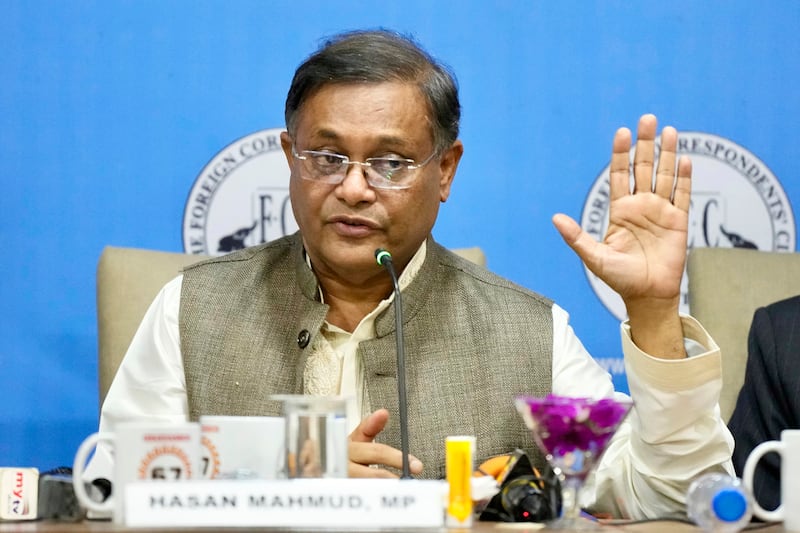Calling it a disgrace for their country, civil society groups on Tuesday demanded that authorities investigate ex-army chief Gen. Aziz Ahmed and his family after Washington blacklisted him for "significant corruption."
Aziz and his immediate family as a result are ineligible to enter the United States, the U.S. State Department announced Monday as it designated the now-retired military official, who had been accused of graft before.
Aziz, who served as army chief from June 2018 to June 2021, had helped his brother evade prosecution, had taken bribes in exchange for handing out government appointments, and had worked closely with his sibling to influence the awarding of military contracts, the department alleged.
For some anti-corruption activists such as Iftekharuzzaman of Transparency International Bangladesh, the blacklisting did not come as a surprise because “the U.S. has been vocal” that it will not tolerate corruption.
“It is really a shame for the country and the people of the country to witness that the former chief of the army is involved in corruption and abused his power,” the executive director of TI Bangladesh, who goes by one name, told BenarNews.
“Now Bangladesh has to prove that there is a rule of law here too. Therefore, these corruption allegations should be investigated through impartial investigation,” Iftekharuzzaman said.
Bangladesh authorities, especially the Anti-Corruption Commission, must take “immediate exemplary action” against Aziz and others involved in corruption, said Badiul Alam Majumdar, who is with a Dhaka-based civil society group.
“It is a huge disgrace for Bangladesh as a country and its people,” the leader of the group, Shushashoner Jonno Nagorik, told BenarNews.
According to him, Aziz and his brothers – he has three – became akin to some of the world’s biggest mafia groups due to the prolonged political patronage and unlimited benefits that military officers enjoyed.
On Tuesday, reporters asked Foreign Minister Hasan Mahmud whether Bangladesh’s government was planning any action against Aziz in response to the U.S. blacklisting him.
“This is a military issue. I don’t want to say anything right now,” the minister said.
“We are in contact with the United States and are working together in anti-corruption, anti-terrorism and other fields internationally.”
The minister said the U.S. government had informed the Bangladesh Embassy in Washington before publicly announcing the ban.

The U.S. announcement, published on the State Department website Monday, said Aziz’s actions had undermined Bangladesh’s democratic institutions.
“Aziz Ahmed engaged in significant corruption by interfering in public processes while helping his brother evade accountability for criminal activity in Bangladesh,” said the statement attributed to spokesman Matthew Miller.
“Aziz also worked closely with his brother to ensure the improper awarding of military contracts and accepted bribes in exchange for government appointments for his personal benefit,” it added.
Aziz: ‘Surprised’
For his part, the ex-army chief of Bangladesh said that all the allegations against him were false, and he was “surprised to hear” about the U.S. announcement.
“[A] friend sent me the copy [of the State Department statement] in the morning,” he said in an interview on Tuesday with Jamuna TV, a private television channel in Bangladesh.
Aziz said that a documentary aired in 2021 by the Qatar-based media group Al Jazeera had made the same claims against him as the U.S.
During the interview, Aziz was asked about the allegations linked to his three brothers who were convicted in a murder case in 2004. Of the three, two evaded arrest and are still on the run, while the third had no such luck and was thrown in jail. He received a presidential pardon in 2018 after more than a decade in prison.
The U.S. allegation that Aziz had helped a brother dodge responsibility for a criminal activity was untrue, the ex-army chief said.
“That brother of mine has been living abroad for a long time. He went abroad with a valid passport. I cannot accept the complaint of using my surname here, it is not correct,” he said.
“Another [complaint] is that I committed corruption by giving my brother a military contract and taking a bribe,” he said, without specifying which of his three siblings he was referring to.
“If anyone can prove I have given any work to any of my brothers or any relatives during my four-year service as the chief of BGB [Border Guard Bangladesh] and three years as army chief, I am ready to accept any consequences,” he said.
If there was no proof, how could the U.S. take action, the interviewer asked Aziz.
“I will not comment on this matter, because I don’t have any data,” he replied.
‘All the Prime Minister’s Men’
According to the Al Jazeera documentary, one of his brothers, Haris Ahmed, had moved to Budapest in 2015 and was doing business there since. Another brother, Anis Ahmed, reportedly lives in Malaysia. Some media reports said the third sibling who was pardoned, Tofail Ahmed Joseph, had also left Bangladesh.
Back in 2021, a Bangladesh court ordered the removal of Al Jazeera’s documentary, “All the Prime Minister’s Men,” from the country’s social media platforms.
At that time, Al Jazeera’s investigative unit defended the documentary.
It “exposes how the head of the Bangladesh army helped two fugitive brothers, convicted of murder, to escape justice,” Al Jazeera said in a statement.
“One brother, Haris Ahmed, boasts that he can use police and paramilitary units to abduct rivals and earn a fortune in bribes thanks to his powerful family links,” it added.
Al Jazeera said it had contacted everyone mentioned in the documentary, including Prime Minister Sheikh Hasina, Aziz’s brothers, senior members of the security forces and ministers, but none of them responded to a detailed set of questions.
